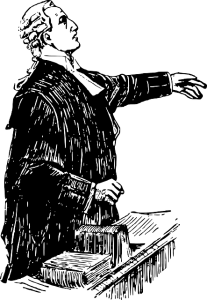 It is no secret that the present system of law is in crisis. The judiciary legislates from the bench. The executive branch disregards laws it does not wish to enforce. The legislative branch enacts massive laws with accompanying regulations. Above all, there is no standard against which to measure law or insure accountability. Law becomes whatever fallible humans deem it to be. What is judged wrong at one time becomes right at another.
It is no secret that the present system of law is in crisis. The judiciary legislates from the bench. The executive branch disregards laws it does not wish to enforce. The legislative branch enacts massive laws with accompanying regulations. Above all, there is no standard against which to measure law or insure accountability. Law becomes whatever fallible humans deem it to be. What is judged wrong at one time becomes right at another.
In response to this perspective, it is refreshing to read a definition of law that is rational and firm. This definition reads: “Law in the proper sense is right reason in harmony with nature. It is spread through the whole human community, unchanging and eternal, calling people to their duty by its commands and deterring them from wrongdoing by its prohibitions…There will not be one such law in Rome and another in Athens, one now and another in the future, but all peoples at all times will be embraced by a single and eternal and unchangeable law; and there will be, as it were, one lord and master of us all—the God who is the author, proposer, and interpreter of that law.”
Is Technology Ruining Your Life? Take A Quick Quiz To Find Out By Clicking Here.
Such a definition clearly grasps a common human nature rooted in reason. It logically concludes that a rational and benevolent God must be the originator of this law since it could not create itself. The definition’s crisp and solid foundation is a refreshing contrast to the different, vague and relative notions of law that exist today.
Who is the author of this definition? Some liberals might guess it to be intolerant fundamentalists or perhaps a medieval philosopher like Saint Thomas Acquinas. The reference to God and Rome might lead to speculation about some early Fathers of the Church.
However the author is none of these. Rather the definition dates from the very time when elementary notions of law were first being developed. It comes from before Christ and at the time of the Romans. The famous orator, Cicero, was the author of this definition. He grasped the notion that all human beings participate in a natural order that can be understood by reason. He grasped that all humans are bound by common moral standards that are the same, then, now and forever. He logically deduced that this legal order must have one God as its originator.
What is missing today is the idea of law as “right reason in harmony with nature.” Relativism has destroyed the notion of right reason since today the only absolute truth is the contradictory affirmation that there is no absolute truth. Modern philosophy has destroyed the idea of an unchangeable human nature since today one can supposedly define one’s own nature. The present secular culture wrongly denies that God has any role in history or in law.
Relativism has destroyed the notion of right reason since today the only absolute truth is the contradictory affirmation that there is no absolute truth. Modern philosophy has destroyed the idea of an unchangeable human nature since today one can supposedly define one’s own nature. The present secular culture wrongly denies that God has any role in history or in law.
Law will only return to order when Cicero’s true and refreshing definition of law is restored. Until then, legal chaos will reign.
(The citation from Cicero is taken from The Republic III: xxii (renumbered III: 33) trans. Niall Rudd, Oxford, Oxford University Press, 1998, pp. 68-69.)
Related Articles: We Must Resist the Temptation to Secession


